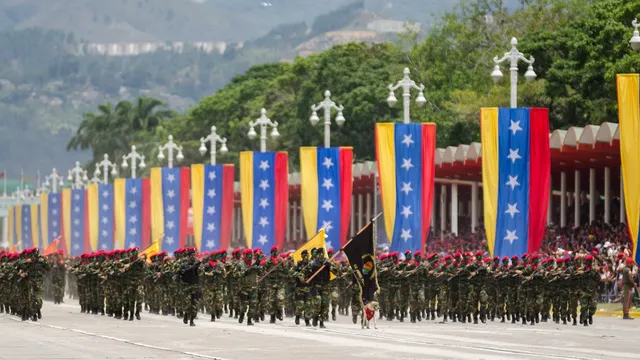
Venezuela intensifies efforts to claim Guyana's oil-rich Essequibo region
2025-04-11 12:00- Venezuela has historically sought control over the oil-rich Essequibo region, exacerbating tensions with Guyana.
- Recent incidents have included border skirmishes and allegations of illegal Venezuelan Navy operations near Guyana's oil facilities.
- There is concern that Venezuela may escalate its aggressive actions towards Guyana through gray zone tactics rather than a direct military invasion.
Express your sentiment!
Insights
Venezuela and Guyana have been embroiled in a territorial dispute over the Essequibo region, a resource-rich area that has increased tensions significantly. Recently, clashes between a Venezuelan gang and the Guyanese Armed Forces occurred in this disputed region, indicative of the growing skirmishes stemming from years of territorial claims by Venezuela. Amidst Venezuela's deteriorating economy, there are concerns that the Maduro regime may escalate its efforts to annex Essequibo either through conventional military means or unconventional gray zone tactics. The situation has worsened with accusations and counter-accusations. The Guyanese government previously accused the Venezuelan Navy of impermissibly approaching an ExxonMobil oil installation located in disputed offshore territories, while Venezuelan President Nicolas Maduro claimed that Guyana's portrayal of the incidents was politically motivated. The international implications of such aggressive maneuvers are serious, as expressed by U.S. officials who warned that a Venezuelan annexation would provoke a severe response from the United States. Venezuela's military capabilities, albeit diminished, still present a formidable challenge. Reports suggest that the Venezuelan Armed Forces are under-equipped with many of their air force assets grounded due to a lack of maintenance and parts. However, the potential for unconventional warfare strategies, such as gray zone attacks, adds a layer of complexity to the situation, particularly when considering Venezuela's investment in transnational criminal organizations that may support such tactics. Experts warn that the current climate of irredentism, observable in various global conflicts, has brought international attention to Venezuela’s ambitions. Should they proceed with a sustained campaign of harassment or military incursions into Essequibo, it could destabilize not only the local region but also provoke broader international intervention, most specifically from the U.S. Navy, which maintains readiness to address threats against its allies. The strategic dimensions of this conflict signal a precarious future as both nations navigate an increasingly tense geopolitical landscape.
Contexts
The dispute over the Essequibo region between Venezuela and Guyana has a long and complex history, rooted in colonial claims and geopolitical interests. The Essequibo River, which runs through this territory, serves as a natural boundary that both countries have historically contested since colonial times. The origins of the dispute can be traced back to the 18th century, when the Spanish Empire, which controlled Venezuela, and the British Empire, which governed Guyana, clashed over territorial boundaries during their colonial expansion. A 1899 arbitration ruling favored British claims, establishing the boundaries that define present-day Guyana, but this decision has been repeatedly challenged by Venezuela, which claims that it was based on flawed interpretations and manipulations of international law. In the decades that followed, even after British Guiana achieved independence in 1966, Venezuela has continued to assert its claims over Essequibo, citing historical rights and national pride. The geopolitical implications of the Essequibo dispute are significant, particularly as Guyana has seen a surge in oil exploration and discovery in its offshore waters, which lie close to the disputed territory. Venezuela perceives this development as a direct threat to its territorial integrity and has voiced strong opposition to foreign investments and oil extraction activities in the region. The rise in global oil prices and the potential economic benefits have heightened tensions, causing both nations to take firmer stances on their claims. Diplomatic efforts to resolve the dispute have been ongoing, with both countries engaging international organizations such as the United Nations in their attempts to seek legal and peaceful resolutions. In 2018, Guyana referred the issue to the International Court of Justice (ICJ) for adjudication, and the court's proceedings have been closely followed, as they may set a precedent for international law regarding territorial disputes. Public opinion on both sides remains divided; many Venezuelans view the Essequibo region as integral to national sovereignty, while a significant portion of the Guyanese population feels a strong connection to the territory that has been part of their national identity since independence. This emotional investment complicates diplomatic negotiations, as leaders are under pressure from their constituents to maintain strong stands regarding their territorial claims. Reports show that Venezuelan leadership has leveraged the dispute in nationalist narratives to bolster internal unity during times of socio-economic crisis. In Guyana, the government has capitalized on the situation to promote national development through economic opportunities linked to the oil sector. International support plays a critical role in the ongoing negotiations, with the United States and other nations voicing support for Guyana's claims, which adds another layer of complexity to the dispute. As the conflict continues, the potential for escalation remains a concern. Both countries need to acknowledge the importance of dialogue and diplomacy in resolving this longstanding issue. Continued tensions could lead to confrontations that may have dire consequences for regional stability. International law provides a framework for resolution, but there is a need for goodwill and cooperation from both parties to reach a viable settlement. The historical context is crucial in understanding the complexities of the Venezuela-Guyana Essequibo dispute, as it intertwines issues of identity, national pride, and resource management, making it one of the most significant territorial conflicts in South America.